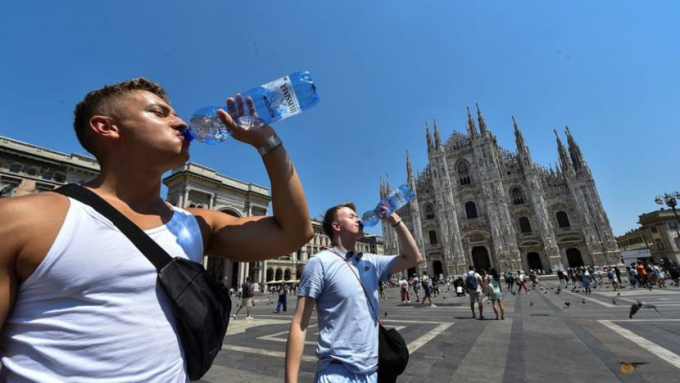June 4, 2025 | 06:02 GMT +7
June 4, 2025 | 06:02 GMT +7
Hotline: 0913.378.918
June 4, 2025 | 06:02 GMT +7
Hotline: 0913.378.918

People who live in warm-weather countries have typically acclimated to high heat. As a person is repeatedly exposed to high temperatures, they develop a lower heart rate and core body temperature over time, improving their tolerance.
The figures, which will likely change as records are updated, give the first indication of heat-related deaths when temperatures from London to Madrid hit nearly 40 degrees Celsius or higher.
The data for England and Wales released on Tuesday (Aug 2) by Britain's Office for National Statistics counts registered deaths during Jul 16-22 against what would be expected over the same period, based on 5-year mortality averages.
The toll for the Iberian Peninsula from the World Health Organization is also provisional.
But the figures from July came nowhere near the 70,000 heat-related deaths during a European heatwave in 2003.
Here are some of the factors that make some heatwaves deadlier than others.
SITUATIONAL
When and where a heatwave hits matters.
The 2003 heatwave hit in the first two weeks of August, closing businesses, wiping out crops and drying up rivers.
France's Paris region felt the effects most. Heatwaves are more intense in cities as concrete and asphalt absorb and retain heat.
The peak coincided with the traditional holiday period, when many children were out of school and families on holiday, in some cases leaving elderly relatives behind.
Of the nearly 15,000 people who died in France, more than 11,000 were over the age of 75.
"A fair number of people said goodbye to grandma sitting in her house and went on vacation," said Matthew Huber, a global expert on heat stress at Purdue University. "Normally, there would have been people checking in" on them.
Doctors were also on holiday. "Emergency services weren't so prepared, and they didn't have people on call," said Mathilde Pascal, a researcher with the French Public Health Agency.
France is now baking in its third heatwave of the 2022 summer, hitting wildlife as well as humans.
ADAPTATION
After the 2003 disaster, many European countries created heatwave action plans and began issuing early warnings. Experts say preparing for extreme heat can save lives.
"More people know what to do in response to a heatwave," said Chloe Brimicombe, a heatwave researcher at the University of Reading in Britain. But some countries are simply better equipped than others: almost 90 per cent of European households, according to US federal statistics.
But technology can't always help. This year, Palestinians living on the crowded Gaza Strip are living through a searing summer heatwave that has been made worse by power cuts that leave them without electricity for as much as 10 hours a day.
Nearly a third of the US population was under a heat warning last month, with forecasts predicting more extreme heat this month.
People living in poorer communities and the homeless are at higher risk.
During last year's heatwave in Phoenix, Arizona, 130 of the 339 people who died were homeless, local health officials said.
Some US cities, including Phoenix, have hired 'heat officers' to help communities cope by handing out water bottles or guiding people to air-conditioned cooling centres.
"The risk of heat-associated death among our unsheltered neighbours is 200 to 300 times higher than the rest of the population," Phoenix heat officer David Hondula said.
PHYSIOLOGICAL RESPONSE
People who live in warm-weather countries have typically acclimated to high heat. As a person is repeatedly exposed to high temperatures, they develop a lower heart rate and core body temperature over time, improving their tolerance.
So the temperature at which people start to die from heat-related illness varies depending on location, as does the related "Minimum Mortality Temperature (MMT)" when all deaths from natural causes reach their lowest point.
"If you're living in India, the MMT is much higher than if you're in the UK," Huber said.
Recent research also suggests that the MMT of an area can increase as heat rises. For every 1 degree Celsius rise in average summertime temperatures in Spain between 1978 and 2017, for example, scientists found a 0.73 degrees Celsius increase in MMT, a study published in April in Environmental Research Letters journal said.
But with much still unknown about extreme heat and human endurance, scientists are not sure if the changes they are seeing in MMTs over time might also be related to people being more aware of the dangers, or better equipped to deal with them.There are several possible explanations, and we still don't know which is the most important cause," Huber said.
(Reuters)

(VAN) Vikas Rambal has quietly built a $5 billion business empire in manufacturing, property and solar, and catapulted onto the Rich List.

(VAN) Available cropland now at less than five percent, according to latest geospatial assessment from FAO and UNOSAT.

(VAN) Alt Carbon has raised $12 million in a seed round as it plans to scale its carbon dioxide removal work in the South Asian nation.

(VAN) Attempts to bring down the price of the Japanese staple have had little effect amid a cost-of-living crisis.

(VAN) Fourth most important food crop in peril as Latin America and Caribbean suffer from slow-onset climate disaster.

(VAN) Shifting market dynamics and the noise around new legislation has propelled Trouw Nutrition’s research around early life nutrition in poultry. Today, it continues to be a key area of research.

(VAN) India is concerned about its food security and the livelihoods of its farmers if more US food imports are allowed.